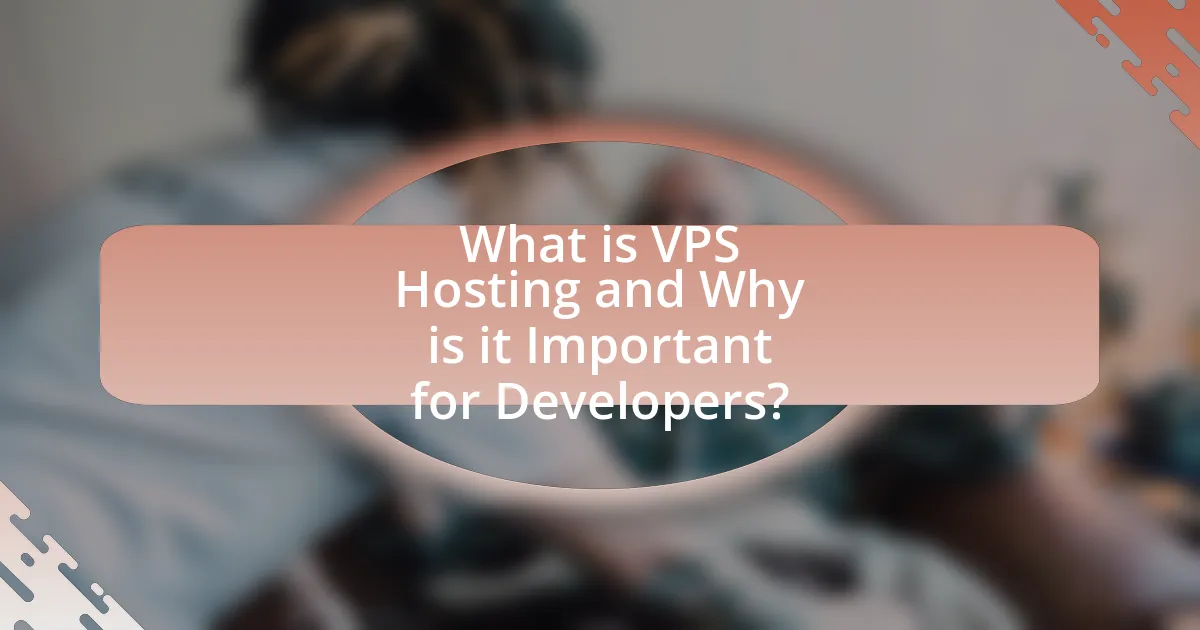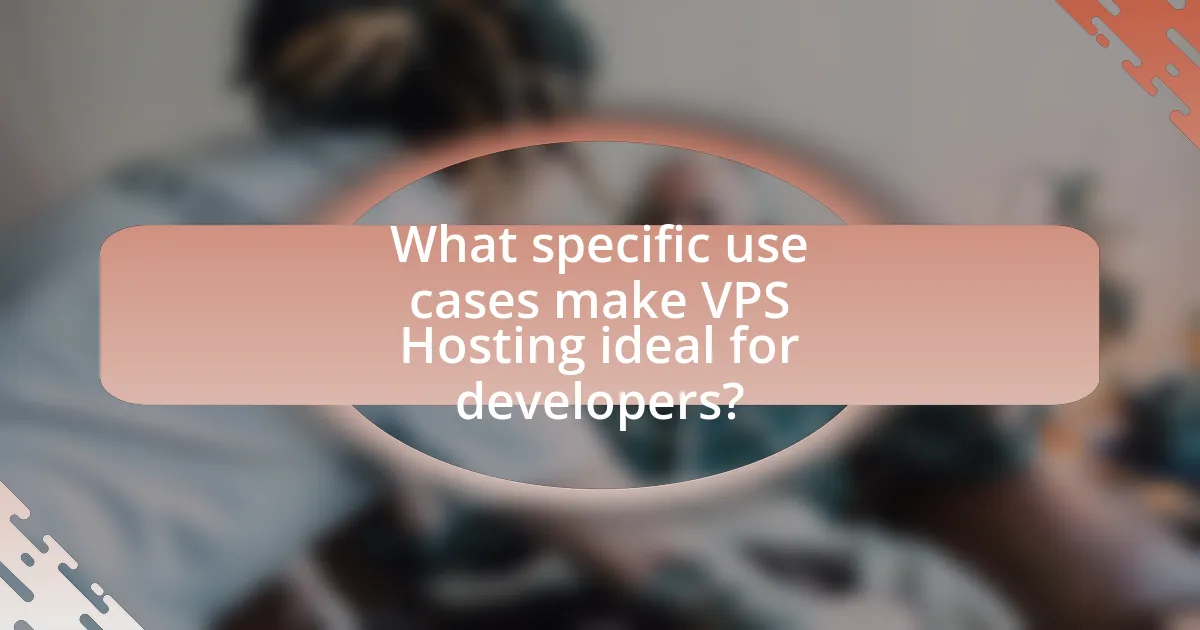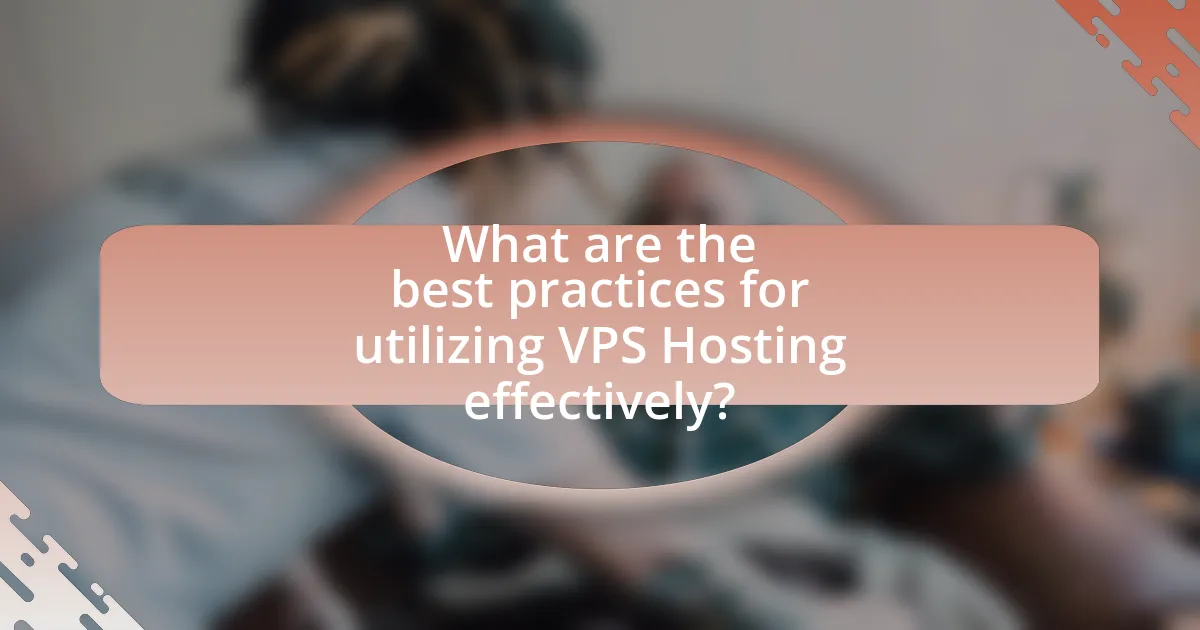VPS hosting, or Virtual Private Server hosting, is a web hosting solution that provides developers with dedicated resources on a virtual machine, offering enhanced control, flexibility, and security compared to shared hosting. This article explores the significance of VPS hosting for developers, highlighting its key features such as root access, scalability, and improved performance. It also discusses the advantages of VPS over other hosting types, the role of virtualization, and best practices for optimizing VPS environments. Additionally, the article addresses common challenges developers face with VPS hosting and provides strategies for effective resource management and security.

What is VPS Hosting and Why is it Important for Developers?
VPS hosting, or Virtual Private Server hosting, is a type of web hosting that provides dedicated resources on a virtual machine, allowing developers to have greater control and flexibility over their hosting environment. This is important for developers because it enables them to configure the server according to their specific needs, install custom software, and run applications without the limitations often found in shared hosting environments. VPS hosting also offers improved performance and security, as resources are allocated specifically to the virtual server, reducing the risk of downtime and vulnerabilities associated with shared resources.
How does VPS Hosting differ from other hosting types?
VPS hosting differs from other hosting types by providing dedicated resources within a shared environment, allowing for greater control and customization. Unlike shared hosting, where multiple users share the same server resources, VPS hosting allocates a specific portion of the server’s resources to each user, ensuring better performance and stability. Additionally, VPS hosting offers root access, enabling users to install custom software and configure their server settings, which is not possible with shared hosting. In contrast to dedicated hosting, which involves renting an entire server, VPS hosting is more cost-effective while still delivering enhanced performance and flexibility. This combination of dedicated resources and affordability makes VPS hosting particularly appealing for developers who require a reliable and customizable hosting solution.
What are the key features of VPS Hosting?
The key features of VPS Hosting include dedicated resources, root access, scalability, and enhanced security. Dedicated resources ensure that users have guaranteed CPU, RAM, and storage, which leads to consistent performance. Root access allows users to install and configure software as needed, providing greater control over the server environment. Scalability enables users to easily upgrade resources based on their needs, accommodating growth without significant downtime. Enhanced security features, such as isolated environments and customizable firewalls, protect against threats and unauthorized access, making VPS Hosting a reliable choice for developers.
Why is virtualization crucial in VPS Hosting?
Virtualization is crucial in VPS hosting because it allows multiple virtual servers to run on a single physical server, optimizing resource utilization and providing isolated environments for users. This technology enables developers to deploy applications in a controlled setting, ensuring that performance and security are maintained without interference from other users. Furthermore, virtualization facilitates easy scalability, allowing developers to adjust resources as needed, which is essential for handling varying workloads efficiently. The ability to create snapshots and backups of virtual machines also enhances disaster recovery options, making VPS hosting a reliable choice for developers.
What are the advantages of VPS Hosting for developers?
VPS hosting offers developers several advantages, including enhanced control, scalability, and cost-effectiveness. Developers benefit from root access, allowing them to configure the server environment according to specific project requirements. This level of control enables the installation of custom software and the optimization of performance settings. Additionally, VPS hosting provides scalability, allowing developers to easily upgrade resources such as CPU, RAM, and storage as project demands grow, which is crucial for handling varying traffic loads. Furthermore, VPS hosting is often more affordable than dedicated servers while still offering dedicated resources, making it a financially viable option for developers looking to balance performance and budget.
How does VPS Hosting enhance performance and speed?
VPS hosting enhances performance and speed by providing dedicated resources to each virtual server, which minimizes resource contention. Unlike shared hosting, where multiple users compete for the same server resources, VPS hosting allocates specific amounts of CPU, RAM, and bandwidth to each user, ensuring consistent performance. This dedicated environment allows for faster data processing and improved load times, which is crucial for applications requiring high availability and responsiveness. Additionally, VPS hosting often includes advanced configurations and optimizations that further enhance speed, such as SSD storage and customizable server settings, leading to a more efficient and reliable hosting experience.
What level of control does VPS Hosting provide to developers?
VPS Hosting provides developers with a high level of control over their server environment. This includes the ability to configure the operating system, install custom software, and manage security settings, which allows for tailored performance and resource allocation. Developers can also access root privileges, enabling them to execute commands and scripts that are not possible in shared hosting environments. This level of control is essential for deploying applications, managing databases, and optimizing server performance, making VPS Hosting a preferred choice for developers seeking flexibility and customization.
Why do developers prefer VPS Hosting over shared hosting?
Developers prefer VPS hosting over shared hosting primarily due to enhanced control and performance. VPS hosting provides dedicated resources, allowing developers to configure their environments according to specific project needs, which is not possible with shared hosting where resources are limited and shared among multiple users. Additionally, VPS hosting offers better security and isolation, reducing the risk of vulnerabilities that can arise from sharing a server with other users. This preference is supported by the fact that VPS environments can handle higher traffic and provide faster load times, which are critical for application performance and user experience.
What are the limitations of shared hosting for developers?
Shared hosting presents several limitations for developers, primarily due to resource constraints and lack of control. Developers often face restricted access to server configurations, which limits their ability to customize environments for specific applications. Additionally, shared hosting typically offers limited bandwidth and storage, which can hinder performance during high traffic periods. Security is another concern, as multiple users share the same server, increasing vulnerability to attacks. Furthermore, developers may encounter issues with software compatibility, as shared hosting providers often restrict the installation of certain applications or programming languages. These limitations can significantly impact the development process and the performance of applications.
How does VPS Hosting address security concerns for developers?
VPS Hosting addresses security concerns for developers by providing isolated environments that enhance data protection and control. Each virtual private server operates independently, which means that developers can configure security settings tailored to their specific needs without interference from other users. This isolation minimizes the risk of cross-contamination from neighboring accounts, a common vulnerability in shared hosting environments. Additionally, VPS Hosting typically includes advanced security features such as firewalls, DDoS protection, and regular security updates, which collectively strengthen the overall security posture. According to a report by the Cybersecurity & Infrastructure Security Agency, isolated environments significantly reduce the likelihood of data breaches, making VPS Hosting a secure choice for developers managing sensitive applications and data.

What specific use cases make VPS Hosting ideal for developers?
VPS Hosting is ideal for developers due to its ability to provide dedicated resources, enhanced control, and scalability. Developers can run multiple applications and websites on a single server without interference, as VPS offers isolated environments. This isolation allows for customized software installations and configurations, which is crucial for testing and development purposes. Additionally, VPS Hosting supports various programming languages and frameworks, enabling developers to work in their preferred environments. The scalability of VPS allows developers to easily upgrade resources as project demands increase, ensuring optimal performance. According to a study by HostingAdvice, 70% of developers prefer VPS for its flexibility and resource allocation, confirming its suitability for development tasks.
How can VPS Hosting support web application development?
VPS hosting supports web application development by providing dedicated resources, enhanced performance, and greater control over the server environment. Developers benefit from the isolation of virtual private servers, which ensures that their applications run smoothly without interference from other users. This setup allows for customized configurations, enabling developers to install specific software and frameworks tailored to their project needs. Additionally, VPS hosting typically offers scalability, allowing developers to easily upgrade resources as their applications grow. According to a study by HostingAdvice, 70% of developers prefer VPS hosting for its balance of cost and performance, highlighting its effectiveness in supporting complex web applications.
What tools and technologies can be utilized on a VPS?
A Virtual Private Server (VPS) can utilize various tools and technologies, including web servers like Apache and Nginx, database management systems such as MySQL and PostgreSQL, and programming languages like PHP, Python, and Ruby. Additionally, containerization technologies like Docker and orchestration tools such as Kubernetes can be deployed on a VPS. These technologies enable developers to create, manage, and scale applications efficiently. The flexibility of a VPS allows for the installation of custom software and frameworks, making it suitable for diverse development environments.
How does VPS Hosting facilitate testing and staging environments?
VPS hosting facilitates testing and staging environments by providing isolated virtual servers that mimic the production environment. This isolation allows developers to test applications without affecting the live site, ensuring that any changes can be evaluated in a safe space. Additionally, VPS hosting offers customizable resources, enabling developers to allocate specific CPU, RAM, and storage based on the requirements of their testing scenarios. This flexibility supports various configurations and software setups, which are essential for thorough testing. Furthermore, VPS environments can be easily replicated, allowing for consistent staging setups that reflect the production environment accurately, thus reducing the risk of deployment issues.
What role does scalability play in VPS Hosting for developers?
Scalability is crucial in VPS hosting for developers as it allows them to adjust resources according to project demands. This flexibility enables developers to easily increase or decrease CPU, RAM, and storage without significant downtime or migration efforts. For instance, during peak traffic periods, a developer can scale up resources to maintain performance, and then scale down during off-peak times to save costs. This on-demand resource allocation is supported by VPS providers, which often offer automated scaling solutions, ensuring that developers can respond swiftly to changing needs while maintaining optimal performance and cost efficiency.
How can developers scale their resources with VPS Hosting?
Developers can scale their resources with VPS Hosting by adjusting their allocated CPU, RAM, and storage based on project demands. VPS Hosting allows for flexible resource management, enabling developers to upgrade or downgrade their server specifications without significant downtime. This adaptability is crucial for handling varying traffic loads, as developers can quickly respond to increased user activity by provisioning additional resources. Furthermore, VPS solutions often provide automated scaling options, allowing for real-time adjustments based on predefined thresholds, ensuring optimal performance and cost-efficiency.
What are the cost implications of scaling on VPS Hosting?
Scaling on VPS Hosting typically incurs increased costs due to the need for additional resources such as CPU, RAM, and storage. As a developer’s application grows, the demand for these resources rises, leading to higher monthly fees. For instance, many VPS providers charge based on the allocated resources, meaning that upgrading to a plan with more CPU cores or RAM directly translates to a higher cost. Additionally, some providers may impose fees for bandwidth usage beyond a certain limit, further increasing expenses as traffic grows. Therefore, developers must carefully assess their scaling needs against the associated costs to ensure budget compliance while meeting performance requirements.

What are the best practices for utilizing VPS Hosting effectively?
To utilize VPS Hosting effectively, developers should prioritize resource allocation, security measures, and regular maintenance. Properly allocating CPU, RAM, and storage based on application needs ensures optimal performance. Implementing security protocols, such as firewalls and regular software updates, protects against vulnerabilities. Additionally, conducting routine backups and monitoring server performance helps maintain system integrity and uptime. These practices are supported by industry standards, which emphasize the importance of resource management and security in VPS environments for reliable application hosting.
How can developers optimize their VPS for performance?
Developers can optimize their VPS for performance by implementing resource allocation strategies, optimizing software configurations, and utilizing caching mechanisms. Resource allocation involves adjusting CPU, RAM, and storage based on application needs, which can significantly enhance performance. For instance, allocating more RAM to a database can reduce query times, as evidenced by studies showing that increased memory can improve database performance by up to 50%.
Optimizing software configurations includes fine-tuning web server settings, such as adjusting the number of worker processes in Apache or Nginx, which can lead to better handling of concurrent requests. Additionally, using lightweight frameworks and minimizing unnecessary services can reduce overhead and improve response times.
Utilizing caching mechanisms, such as Redis or Memcached, allows frequently accessed data to be stored in memory, reducing the need for repeated database queries. Research indicates that implementing caching can decrease load times by up to 70%, thereby enhancing user experience and server efficiency.
By focusing on these strategies, developers can effectively enhance the performance of their VPS environments.
What configurations should developers consider for their VPS?
Developers should consider CPU allocation, RAM size, storage type, bandwidth limits, and operating system when configuring their VPS. CPU allocation affects processing power, with higher allocations enabling better performance for resource-intensive applications. RAM size is crucial for multitasking and running applications smoothly; a minimum of 2GB is often recommended for basic tasks, while more demanding applications may require 4GB or more. Storage type, whether SSD or HDD, impacts speed and reliability, with SSDs providing faster data access. Bandwidth limits determine the amount of data that can be transferred, which is essential for applications with high traffic. Lastly, the choice of operating system, such as Linux or Windows, influences software compatibility and server management capabilities. These configurations collectively ensure optimal performance and reliability for development needs.
How can developers ensure security on their VPS?
Developers can ensure security on their VPS by implementing strong access controls, regularly updating software, and utilizing firewalls. Strong access controls, such as using SSH keys instead of passwords and limiting user permissions, significantly reduce unauthorized access risks. Regular software updates patch vulnerabilities, as evidenced by the fact that 60% of breaches exploit known vulnerabilities that could have been mitigated through timely updates. Firewalls, both hardware and software, act as barriers against malicious traffic, further enhancing the security posture of the VPS.
What common challenges do developers face with VPS Hosting?
Developers commonly face several challenges with VPS hosting, including resource management, security concerns, and technical complexity. Resource management issues arise when developers must allocate and optimize CPU, RAM, and storage to ensure performance meets application demands. Security concerns stem from the need to configure firewalls, manage updates, and protect against vulnerabilities, as VPS environments can be more exposed than shared hosting. Technical complexity is another challenge, as developers often need advanced knowledge of server management, including command-line interfaces and system configurations, which can lead to increased setup time and potential for errors. These challenges highlight the necessity for developers to possess both technical skills and a proactive approach to server management in a VPS environment.
How can developers troubleshoot performance issues on VPS?
Developers can troubleshoot performance issues on VPS by systematically analyzing resource usage, optimizing configurations, and monitoring system performance. First, they should utilize tools like top, htop, or vmstat to identify CPU, memory, and disk I/O bottlenecks. For instance, if CPU usage is consistently high, developers may need to optimize their application code or adjust server settings. Additionally, checking server logs can reveal errors or warnings that indicate underlying issues. Implementing caching mechanisms and load balancing can also enhance performance. Regularly updating software and ensuring that the VPS is not overloaded with unnecessary services are crucial steps. These methods are validated by industry practices that emphasize proactive monitoring and optimization to maintain optimal VPS performance.
What are the best strategies for managing server resources?
The best strategies for managing server resources include resource allocation, load balancing, and monitoring. Resource allocation involves distributing CPU, memory, and storage effectively to ensure optimal performance; for instance, using virtualization technologies allows multiple virtual servers to run on a single physical server, maximizing resource utilization. Load balancing distributes incoming traffic across multiple servers, preventing any single server from becoming a bottleneck, which can enhance reliability and performance. Monitoring tools track resource usage in real-time, enabling proactive management and adjustments based on demand, which is crucial for maintaining efficiency and preventing downtime. These strategies are validated by industry practices that show improved performance and reduced costs in environments utilizing VPS hosting.
What tips can help developers maximize their VPS Hosting experience?
To maximize their VPS hosting experience, developers should focus on optimizing server configurations, implementing security measures, and utilizing automation tools. Optimizing server configurations involves selecting the right operating system, adjusting resource allocations, and fine-tuning performance settings to match application requirements. Implementing security measures, such as regular updates, firewalls, and SSH key authentication, protects against vulnerabilities and unauthorized access. Utilizing automation tools, like configuration management and deployment scripts, streamlines workflows and reduces manual errors, enhancing efficiency. These strategies collectively improve performance, security, and management of VPS hosting environments, leading to a more effective development process.

